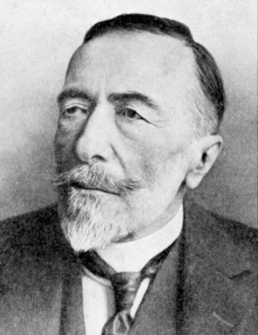These life stories may contain descriptions of childhood trauma and abuse, as well as images, voices and names of people now deceased. If you need help, you can find contact details for some relevant support services on our support page.
Polish-British writer Joseph Conrad (1857-1924) was in foster and kinship care as a child.
Josef Teodor Konrad Korzeniowski was born in Ukraine to Polish parents. His father, Apollo Korzeniowski, was exiled to Vologda in northern Russia in 1861 for being one of the organisers of the January Insurrection, a rebellion against Russian rule in Poland.
Why the description “revolutionary” should have been applied all through Europe to the Polish risings of 1831 and 1863 I really cannot understand. These risings were purely revolts against foreign domination. The Russians themselves called them “rebellions,” which, from their point of view, was the exact truth…My father was no more revolutionary than the others…He was simply a patriot in the sense of a man who believing in the spirituality of a national existence could not bear to see that spirit enslaved (Conrad, ix-x).
Apollo’s wife, Ewa Bobrowska, followed him to Volgda with young Josef.
Josef was only seven when his mother died of tuberculosis in 1865. For more than three years his father, a poet, translator and publisher as well as political exile, looked after the small boy, reading him Polish poetry and teaching him Maths and French.
In 1869 Apollo died, also of tuberculosis.
Initially, Josef was cared for by a friend of his father’s, Stefan Buszczynski, before his maternal grandmother, Teofila Bobrowski, became his guardian in 1870 whereupon the boy lived with her in Krakow. His uncle Tadeusz Bobrowski oversaw his nephew’s education, however, initially arranging for Josef to attend a boarding school and then, because Josef was behind in his studies, organising a “personal tutor, a young medical student called Adam Marek Pulman, who also accompanied Conrad on his long summer holidays” (Middleton, 3).
When his grandmother died in 1873, Tadeus Bobrowski became his guardian and sixteen-year-old Joself was sent to live with a distant cousin, Antoni Syrocznski, in Lwow (now Lviv in Ukraine).
He spent ten months at the Syroczynski’s passing the seventh class of the gymnasium. Intellectually he was very well developed, but he did not like the routine of school life, which bored and tortured him…He said that he had a great talent and and that he would become a great writer. This, together with a sarcastic, ironic facial expression and many critical comments evoked wonder from his teachers and ridicule from his classmates (Bojarski, 10).
Although not happy about it, Uncle Tadeus then assisted his young nephew to realise his dream by using his contacts and securing Josef passage on a ship sailing out of Marseille. This was the beginning of Josef’s adventuring on the high seas for twenty years and rising through the ranks from apprentice to captain.
Between 1879 and 1893, and in addition to Martinique, the Danish West Indies, India, and the Congo, Josef made several trips to Australia.
As the master of the Otago (built in 1869 in Glasglow, Scotland and owned by Henry Simpson & Sons of Port Adelaide in South Australia) – his only captaincy position – Joseph Conrad visited the small port of Minlacowie in 1889, giving the farmers’ wives a “tea party” on board the ship which was “then lying alongside the God-forsaken jetty there” (Signals, 9).
(Otago Bay in Tasmania is named after the Otago and there is”still some of the hulk left on the riverbank” (Raabus) as well as a small plaque “opposite a small lane called Conrad Drive” (Scanlon).)
Conrad says he suddenly sat down one day at breakfast and began drafting his first book, Almayer’s Folly, which he worked on for a number of years, finally sending the manuscript to publisher T.F. Unwin in 1894 when he was in London and looking for another job aboard a ship.
Josef Korzeniowski adopted the name Joseph Conrad when Almayer’s Folly was published in 1895; he had learned from long experience that the name Korzeniowski was impossible on British lips (Britannica).
In 1894 Conrad’s uncle Tadeus died, leaving Conrad enough money to commence his second book and to write for a year without the pressure of having to work full time.
Over the next thirty years, Conrad wrote thirteen novels, twenty-eight short stories, and a number of essays.
Many of these works drew on his sea years, and few authors since have managed to evoke this life as vividly, honestly and poetically. While he never returned to Australia, he cherished his memories of his time on its ships and shore and maintained his links with people there (Signals, 12).
Joseph Conrad was recognised as one of the greatest writers in the English language by the time of his death at the age of sixty-six.
References:
Bojarksi, Edmund. “Joseph Conrad: Original Ugliness.” Polish American Studies, vol. 23 (1966): 8-11.
“Conrad in Australia.” Signals, vol. 81 (2007-2008): 8-12. file:///C:/Users/deemi/Dropbox/My%20PC%20(DESKTOP-NO68U2M)/Downloads/is-polish_conrad_pdf%20(1).pdf
Conrad, Joseph. A Personal Record: Some Reminiscences. New York, NY: Cosimo, Inc., 2005.
“Joseph Conrad.” Britannica. https://www.britannica.com/biography/Joseph-Conrad
Lane, Ann. “Youthful Latitudes: Joseph Conrad’s Iconography of Geography and Australia. Yearbook of Conrad Studies (Poland), 2006, vol. 2 (2006): 31-44. https://www.jstor.org/stable/pdf/26414164.pdf?casa_token=quKYo0IZ_hoAAAAA:aTK5h8OdeQyylb3v_RTOsKBxhPFv2QOourOPQkqebODkkmEWCrsC7sjallHYsOEIq_x3d-mLZxTwlDG43AO498bigfYyaQX52ojuQCf8pUhYR58rSkg
Hodges, Robert. The Dual Heritage of Joseph Conrad. De Gruyter, Inc.
Middleton, Tim. Joseph Conrad. Taylor and Francis, 2013.
Raabus, Carol. “Tasmania’s connection to author Joseph Conrad remembered on anniversary of his death.” ABC News, 3 August 2016. https://www.abc.net.au/news/2016-08-03/tasmanias-connection-to-writer-joseph-conrad-otago-bay/7684492
Scanlon, Mike. “History. Joseph Conrad’s Otago and its time in Newcastle.” Newcastle Herald, 26 June 2015. https://www.newcastleherald.com.au/story/3171271/joseph-conrads-maritime-link-to-newcastle/
Stape, John. The Several Lives of Joseph Conrad. New York: Pantheon Books, 2007.
Image available here.
